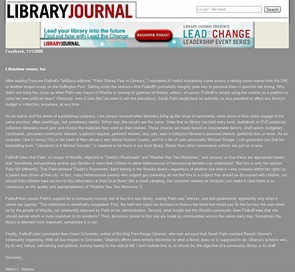Library Journal

Feedback, 11/1/2008
Librarians censor, too.
After reading Francine Fialkoff's TalkBack editorial, “Palin Strikes Fear in Libraries,” I wondered if I hadn't mistakenly come across a talking points memo from the DNC or another insipid essay on the Huffington Post. Setting aside the obvious—that Fialkoff's journalistic integrity gave way to personal bias—I question her timing. Why didn't she bring this issue up when Palin was mayor of Wasilla or running for governor of Alaska, unless, of course, Fialkoff is simply using the column as a platform to voice her own political views? Obviously, even if John McCain were to win the presidency, Sarah Palin would have no authority as vice president to affect any library's budget or collection, anywhere, at any time.
As an author and the owner of a publishing company, I am always amused when librarians bring up the issue of censorship, when some in their ranks engage in the same practice, often unwittingly, but sometimes overtly. Either way, the results are the same. Given that no library can hold every book, audiobook or DVD produced, collection librarians must pick and choose the materials they want on their shelves. Those choices are made based on innumerable factors: shelf space, budgetary constraints, perceived community interest, a patron's request, pertinent reviews, and, yes, even a collection librarian’s personal interest, (political) bias or whim. As an example, I live in Jersey City in the heart of New Jersey’s very liberal Hudson County, and I'm a fan of radio personality Michael Savage. I can guarantee you that his bestselling book, “Liberalism Is A Mental Disorder,” is nowhere to be found in my local library. Books from other conservative authors are just as scarce.
Failkoff notes that Palin, as mayor of Wasilla, objected to "Daddy's Roommate" and "Heather Has Two Mommies," and assures us that these are appropriate books that “sensitively and positively portray gay families in ways that children in either heterosexual or homosexual families can understand." But this is only her opinion. Palin felt differently. That Palin believed “Daddy's Roommate” didn't belong in the Wasilla library—regardless of whether she read it—was certainly within her rights as a parent and citizen of that city. In fact, many heterosexual parents who support gay parenting do not feel this is a subject that should be discussed with children, nor should their children have access to this information at their local library (As a small sampling, the customer reviews on Amazon.com make it clear there is no consensus on the quality and appropriateness of "Heather Has Two Mommies.")
Failkoff then mocks Palin's support for a community hockey rink in lieu of a new library, stating Palin was “anti-tax, and anti-government, apparently only when it serves her agenda.” This statement is remarkably misguided. First, the half-cent sales tax increase to finance the bond that would pay for the hockey rink was voted on by the people of Wasilla, not unilaterally imposed by Palin or her administration. Second, what insight into the Wasilla community does Failkoff have that she should decide which is more important to its residents? Third, decisions similar to this one are made by communities across the nation every day. Sometimes the library is deemed most important; sometimes it is not.
Finally, Failkoff cites comments from Karen Schneider, author of the blog Free Range Librarian, who was annoyed that Sarah Palin mocked Barack Obama's community organizing. With all due respect to Schneider, Obama's efforts were entirely dissimilar to what a library does—or is supposed to do.
Obama's activism was, by its very nature, self-serving and political, leaning heavily to the radical left. I don't believe that is, or should be, the objective of a community library or its staff.
Alfred C. Martino
Jersey City, NJ